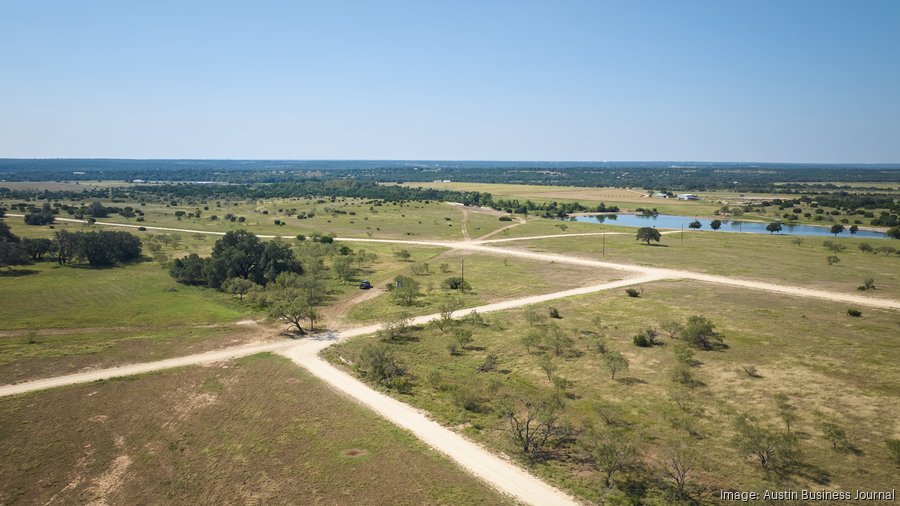
Austin Business Journal shares, "Matt Riehs' grandfather gifted his mother 2 acres, and then his grandmother helped her build a home on it. His aunt paid for his first 4-H project there. Those acts provided Riehs — an inner-city kid — with what he now describes as a "Huckleberry Finn lifestyle," which he credits for changing his future for the better.
While he wanted to become an agricultural teacher at one point, he has spent more than a decade as a large-acreage subdivision developer. For the last three years, he has owned Bertram-based LandHomesTexas LLC, which works in conjunction with his Katy-based brokerage Vertical Integration Realty LLC, to market, buy, sell and develop land homes with large acreage on the outskirts of Austin and Houston.
LandHomesTexas is offering a counter to what's become a typical development pattern in the Austin area — particularly in the suburbs as the population has boomed. Developers have been aiming to squeeze as many homes as possible on former farm land to meet housing demand and make returns on their investments. Only recently have they begun putting more emphasis on amenities.
What LandHomes does is work with large landowners who are aiming to sell but don't want their properties to become dense developments, and it then markets to demographics with that lifestyle preference. It employs on-staff engineering and construction experts to work with clients to utilize the land in a cost-effective way. It's also moving into the realm of promoting more economic uses of properties, so that people can garden or raise livestock for their own consumption.
"We're really geared more toward creating a holistic and down-to-earth way to utilize the land so that it can also change hands and not just be a high-density subdivision with 6,000-square-foot lots," Riehs said. "It's definitely to try to save some home sites for people that want to raise families in settings that are ... a little slower pace, a little more sipping tea on the porch in the evenings, not worried about where your kids are at because they're on the property. And you know that it's safe for them, and they get to explore themselves as individuals a little bit more than just being inside on an iPad or just going to the neighbor at the end of the cul-de-sac."
Riehs said the company has more than 20 projects spread across six counties, but most have been concentrated in the Austin area in Bell, Burnet and Williamson counties, particularly in areas near Jarrell, Georgetown, Marble Falls, Liberty Hills, Briggs and Bertram. He estimated it has about $200 million in properties under management and could approach $1 billion in the next two years.
Developers generally are turned off by larger lots because they're not deemed cost-effective. Riehs acknowledged it's a challenge to juggle cost efficiency, but he said increased acreage actually can reduce expenses for things like utilities and roads because they don't need to serve hundreds of homes. He said his company maintains agricultural exemptions on properties and also aims to keep water use down.
He estimated that lots typically sell for between $240,000 and $360,000 in the corridor northwest of Austin. The average lot size is 10 acres.
"We're utilizing the land in the most cost-efficient way possible so that the large-acre land users are actually able to exit this piece of property," he said.
As things stand, however, cost constraints have prevented the company from doing all of the community work it has intended to do on the properties, he said. But that's about to change.
Mariah Casanova, who handles marketing and business development for LandHomesTexas, said the company is aiming to make a bigger push around implementing communal effort and self-sustainability.
Casanova said it has a vision of being a "resource-rich brokerage," where it would essentially ask clients what they want to do on their homestead and work with them to bring the vision to life. That could be in the form of edible landscapes, communal gardens, livestock operations, beehives or other things.
"It's more of an effort to see what's the dream around the land, what are some things that we can help you with to use the land to the highest and best use, and then also really trying to help bring self-governance and self-sustainability back to communities that potentially have really stepped away from the farm and ranch aspect," she said.
Many landowners currently in the path of growth want to turn their land into a legacy project, she said, so selling for the highest profit can feel to some like selling out.
She views LandHomeTexas' model as one that still promotes a pro-growth mindset in Central Texas but does so in a way that keeps out high-density development. At the same time, the company also works hand-in-hand with people who will preserve a way of life, keep community intact and promote conservation and preservation as much as possible, she said.
"We believe deeply that people need homes and places to live and reside, but at the end of the day it's really important for us to do that with responsibility," Casanova said."
Source: Austin Business Journal
Written by: Justin Sayers
Published: September 20, 2025
Posted by Grossman & Jones Group on

Leave A Comment